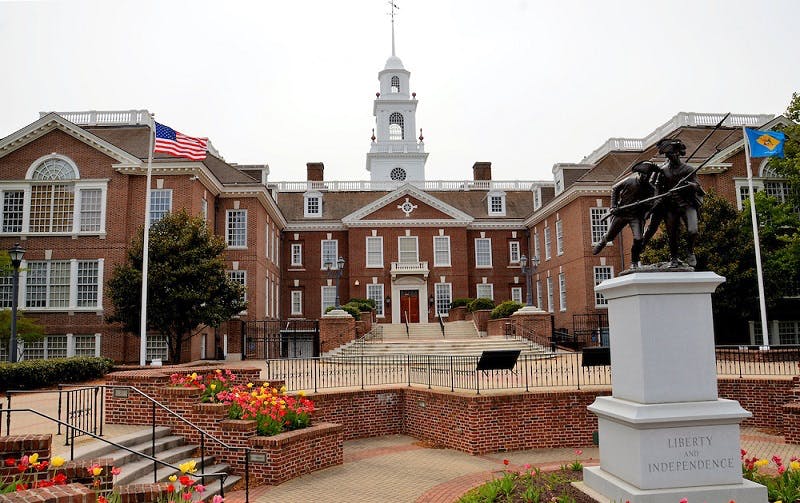
Even after a year punished by the COVID-19 pandemic, Delaware has $669 million in surplus, a state budget committee forecast said Monday.
But the state officials advising the Delaware Economic and Financial Advisory Council also pointed out that state revenues are expected to decline by 2.9 percent during the 2022 fiscal year and only rebound .8 percent in 2023, an indication that some of the extra cash should be put aside for to make up for any downturns or slow growth.
Fiscal year 2022 starts July 1 and the budget for it must be passed by the Delaware General Assembly by end of business June 30.
Gov. John Carney already has allotted $347 million of that surplus in his 2022 budget presented to the legislature on projects that include a $50 million Clean Water Fund.
He budgeted that money because it’s the amount DEFAC said would be surplus during its December quarterly meeting. On Monday, DEFAC said there was an additional $322 million but noted that could change between now and May, when it meets again.
Error, group does not exist! Check your syntax! (ID: 11)
Among the things the budget assumes is that all of the pandemic relief measures passed in 2020 and 2021 will take place; there will not be another surge of COVID-19; there is widespread vaccination; strong revenues will prevent peaks and valleys; state and local employment rebounds in the fall when schools re-open; the Fed maintains its money borrowing rate near 0% through mid-2024; and crude oil rises by 51 percent in calendar year 2021, then falls by 4% in 2022.
Delaware’s budget has built-in curbs to prevent it from seesawing from feast to famine when revenues change substantially. That includes rules that set aside money for a rainy day fund and a reserve fund, as well as rules that only allow the state to budget 98 percent of available revenues.
The state’s remarkable surplus, which budget officials refer to as extraordinary revenues in excess of the state benchmark, comes from strong real estate transfer taxes, franchise fees and taxes, dividends and interest, and unclaimed property as well as increased government benefits paid to the unemployed and to businesses.
And Delaware had a lot of unemployed, with 84,000 people losing their jobs in March 2020. Only half of them have been able to go back to work, and Delaware is expected to have slower job growth than the national average, DEFAC was told.
The way Delaware’s revenue stream now is balanced is a major shift from the way Delaware’s revenue usually ranks, said Michael Houghton, chairman of DEFAC.
Error, group does not exist! Check your syntax! (ID: 11)
Normally, personal income tax would rank at the top. In the current forecast, it’s down $178 million to an estimated $4.9 billion, despite the government help.
He said relying on revenue sources such as unclaimed property is “disproportionate and dangerous.”
That money “may not appear to be volatile to the extent that there’s a degree of stability in it, but it is,” he said. “It is extremely volatile and fragile, in so many ways.” Delaware should be relying on personal income and business tax revenue, he said.
DEFAC has discussed for years “recalibrating the tax scheme to try to rebalance it.”
“I doubt we’ll be doing any of that this year because we’re still in a positive but unstable situation,” he said, then noted he wanted the council members to be aware of the concerns.
“I think there’s going to be a day of recalibration that’s going to be required within the next five to 10 years,” Houghton said.
Error, group does not exist! Check your syntax! (ID: 11)
David Roose, director of Research and Tax Policy for the Delaware Department of Finance, pointed out that government benefits such as unemployment and food stamps had remarkably bumped up recession income to the highest levels since 1950. The third highest was in 1975, he said.
“On the one hand, it could be argued that this is somewhat artificial economic activity and doesn’t really reflect the underlying economy and perhaps should not reflect the (benchmark) calculation,” Roose said. “On the other hand, as was discussed by the task force a few years back, a large part of the rationale for including personal income in the benchmark is that as personal income grows, demand for government services also grows.”
When the committee discusses the budget and benchmarks in May, it might want to consider the source of the personal income growth, he said.
To see the documents related to the DEFAC meeting, go here.
Error, group does not exist! Check your syntax! (ID: 11)
Also of interest:
- Delaware’s motor fuel tax revenues are expected to drop $5 million to $132.6 million. Traffic has increased slightly but fuel prices have gone up and are expected to rise by 51% this in calendar year 2021. Car sales continue to do well, but other DMV revenue is expected to decline $2 million.
- Delaware’s bar and restaurant jobs and entertainment jobs have been slow to rebound.
- Based on a census survey, 20% of Delawareans expect to lose income in the next four weeks; 1/3 of Delawareans expect to be foreclosed on or evicted from their homes; 1/3 of Delawareans say they have difficulty paying usual household expenses; and 1/3 of Delawareans stopped going to an office and worked from home.
- Working from home could affect the state’s income tax revenues because employment taxes are paid in the state where the work is done. So people who usually go to an office in Delaware but are working from home may pay the taxes there and vice versa.
- Tax withholding has risen slightly, but bonuses appear to be largely flat over last year.
- The huge rise in home sales may reflect a real estate bubble caused by COVID-19 and profits taken from high stock prices.
- One of the unknowns about personal income tax is how people will be taxed for income from Paycheck Protection Program loans.
- Delaware has seen 15,000 new corporations in 2021, compared to 12,000 the year before. That’s largely a result of existing companies who expand.
- $30 million of corporate revenues are from compliance programs that push companies to pay their taxes. That number is not expected to be as high in the future.
- Pennsylvania closing its casinos in December helped casino revenue, and state taxes.
- High jackpots for both MegaMillions and PowerBall added $3 million in tax revenues to the state’s coffers.
- Maryland increased its cigarette tax on Sunday to $3.75 a pack from $2. That’s expected to net Delaware $700,000 in taxes from increased cigarette sales during fiscal year 2021 and $6 million next year.

Betsy Price is a Wilmington freelance writer who has 40 years of experience, including 15 at The News Journal in Delaware.
Share this Post




